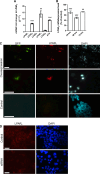Modulation of LPA receptor expression in the human brain following neurotrauma
- PMID: 21234797
- PMCID: PMC11498475
- DOI: 10.1007/s10571-011-9650-0
Modulation of LPA receptor expression in the human brain following neurotrauma
Abstract
Lysophosphatidic acid (LPA) is involved in physiological and pathological states, including in neural development and inflammation. We assessed the expression pattern of the LPA receptors 1-3 and of LPA-producing enzyme autotaxin in post-mortem human brain tissue, both in normal individuals and in individuals who died following traumatic brain injury. We found that LPA receptors and autotaxin are weakly expressed in the normal control adult brain. Quantitative PCR for the LPA receptors and autotaxin mRNA showed an increase of LPAR(2) and a decrease of autotaxin mRNA expression in the cortex following brain injury. Immunohistochemical analysis showed that LPAR(1) colocalized with astrocytes and that LPAR(2) is present on the ependymal cells lining the lateral ventricle in the brain samples from individuals who died following severe head injury. This work shows for the first time that key components of the LPA pathway are modulated following TBI in humans.
Figures




References
-
- Bouquet C, Ravaille-Veron M, Propst F, Nothias F (2007) MAP1B coordinates microtubule and actin filament remodeling in adult mouse Schwann cell tips and DRG neuron growth cones. Mol Cell Neurosci 36:235–247 - PubMed
-
- Contos JJ, Chun J (2001) The mouse lp(A3)/Edg7 lysophosphatidic acid receptor gene: genomic structure, chromosomal localization, and expression pattern. Gene 267:243–253 - PubMed
-
- Crack PJ, Gould J, Bye N, Ross S, Ali U, Habgood MD, Morganti-Kossman C, Saunders NR, Hertzog PJ (2009) The genomic profile of the cerebral cortex after closed head injury in mice: effects of minocycline. J Neural Transm 116:1–12 - PubMed
-
- Dennis J, Nogaroli L, Fuss B (2005) Phosphodiesterase-Ialpha/autotaxin (PD-Ialpha/ATX): a multifunctional protein involved in central nervous system development and disease. J Neurosci Res 82:737–742 - PubMed
Publication types
MeSH terms
Substances
LinkOut - more resources
Full Text Sources
Other Literature Sources
Miscellaneous

